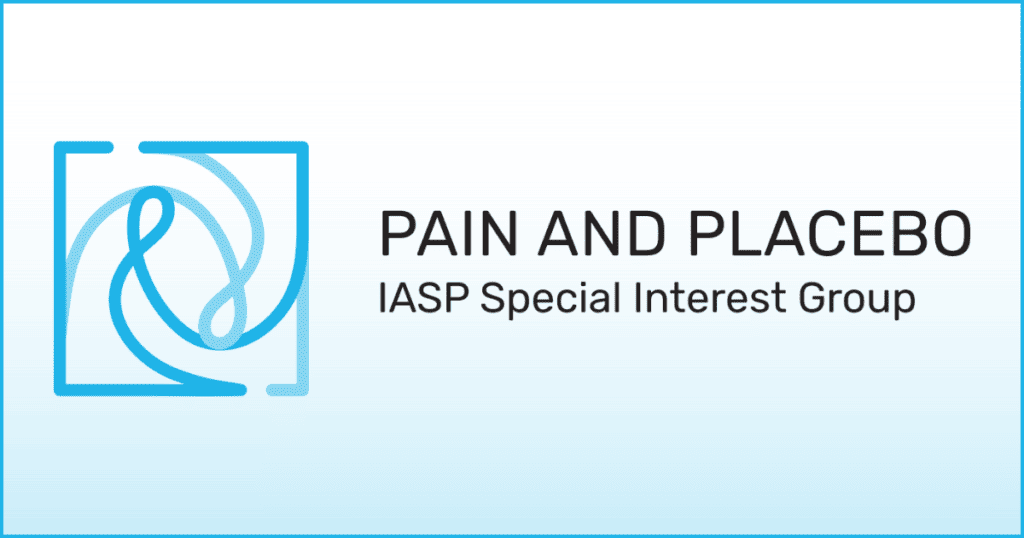Date: Tuesday, May 23, 2023, 1:00 p.m. to 2:15 p.m., Eastern (US) Time
This webinar is being produced through a collaboration of the IASP’s Pain and Placebo Special Interest Group and the University of Maryland, Baltimore, USA – in particular – the University of Maryland School of Nursing’s Placebo Beyond Opinions Center and the University of Maryland’s Center to Advance Chronic Pain Research. All three groups are aligned on advancing unbiased knowledge of placebo effects by promoting interdisciplinary investigation of the placebo phenomenon and nurturing placebo research.
This webinar is unique in that it is being hosted (both in-person and virtually) by the University of Maryland. As such, a link to the webinar will not be distributed upon registration – rather, a link to the webinar will be distributed to registrants via email both 24 hours and 1 hour prior to the webinar. For any questions, please feel free to email Gregory Carbonetti at gregory.carbonetti@iasp-pain.org.


The IASP defines pain as “an unpleasant sensory and emotional experience associated with, or resembling that associated with, actual or potential tissue damage” to better articulate the biopsychosocial dimensions of this phenomenon. While our understanding of pain has greatly evolved over the past decades, there are still fundamental questions that need to be addressed, including the psychological components of pain.
This webinar will explore the psychology factors that modulate pain perception and pain memory, the psychology of placebo and the learning mechanisms of placebo effects, and the psychology of education – with a special interest in increasing the effectiveness of teaching, upbringing, and memory training. The webinar will feature:
- Przemysław Bąbel, PhD, Jagiellonian University, Krakow, Poland
- Luana Colloca, MD PhD, University of Maryland School of Nursing, USA (host)
About the presenter
 Przemysław Bąbel, PhD, is a full professor of psychology at Jagiellonian University in Krakow, Poland, where he serves as the director of the Institute of Psychology, the chair of the Research Discipline Council for Psychology, and the head of the Pain Research Group. His research interests include placebo effects in pain, the memory of pain, and psychological factors affecting pain perception. Babel has co-authored nearly 100 scientific publications and more than 100 popular science publications. In 2019, he was awarded the status of Fellow by the Association for Psychological Science for his sustained outstanding contributions to the science of psychology.
Przemysław Bąbel, PhD, is a full professor of psychology at Jagiellonian University in Krakow, Poland, where he serves as the director of the Institute of Psychology, the chair of the Research Discipline Council for Psychology, and the head of the Pain Research Group. His research interests include placebo effects in pain, the memory of pain, and psychological factors affecting pain perception. Babel has co-authored nearly 100 scientific publications and more than 100 popular science publications. In 2019, he was awarded the status of Fellow by the Association for Psychological Science for his sustained outstanding contributions to the science of psychology.
About the host
Luana Colloca , MD PhD, is an NIH-funded physician-scientist who conducted ground-breaking studies that have advanced scientific understanding of the psychoneurobiological bases of endogenous systems for pain modulation in humans including the discovery that the vasopressin system is involved in the enhancement of placebo effects with a dimorphic effect. Currently, her team conducts basic and translational research on the genomics of orofacial chronic pain, brain mechanisms of expectancy – and observationally induced hypoalgesia – and immersive virtual reality. Her research has been published in top-ranked international journals including Biological Psychiatry, Pain, Nature Neuroscience, JAMA, Lancet Neurology, Science, and NEJM. The impact of her innovative work is clear from her outstanding publications, citation rate, numerous invited lectures worldwide, and media featured by The National Geographic, The New Scientist, Washington Post, Boston Globe, The New Yorker, Nature, The Guardian, The Wall Street Journal, and News and World Reports.
, MD PhD, is an NIH-funded physician-scientist who conducted ground-breaking studies that have advanced scientific understanding of the psychoneurobiological bases of endogenous systems for pain modulation in humans including the discovery that the vasopressin system is involved in the enhancement of placebo effects with a dimorphic effect. Currently, her team conducts basic and translational research on the genomics of orofacial chronic pain, brain mechanisms of expectancy – and observationally induced hypoalgesia – and immersive virtual reality. Her research has been published in top-ranked international journals including Biological Psychiatry, Pain, Nature Neuroscience, JAMA, Lancet Neurology, Science, and NEJM. The impact of her innovative work is clear from her outstanding publications, citation rate, numerous invited lectures worldwide, and media featured by The National Geographic, The New Scientist, Washington Post, Boston Globe, The New Yorker, Nature, The Guardian, The Wall Street Journal, and News and World Reports.


